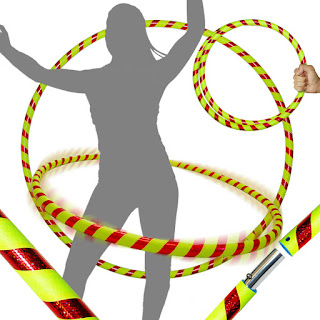When I was a young girl, hula hooping was a big craze. I wanted a hula hoop so badly and begged my mother for one. Finally, after much nagging on my part, she gave in and bought me a beautiful red and yellow hoop. I was so proud of it and although I had no idea how to use it, I spent hours trying to figure it out.
Slipping the large, plastic hoop over my head, I worked it down toward my little hips. Holding it on each side, I began to shimmy my body side to side. The hoop circled once or twice before falling to the ground. Frustrated, I tried again and again until finally, I mastered it. From that day forward, I spent hours entertaining myself with that simple ring of joy.
Today, as I think back on that hula hoop, I remember how I felt to be inside it. It was a safe zone. A place where I could be me and do what I enjoyed doing, even if I was only moving side to side. Fast forward to today, I often wish I were inside a hula hoop again, enjoying the simple pleasures of life. But as I’ve grown older and health challenges have become more prevalent, I don’t think there’s a hula hoop big enough to encompass my woes.
And then, I think about those I love who’ve recently been diagnosed with cancer. How desperately I want to offer them advice on how to go forward. I want to save them from learning things the hard way, like I did when I was diagnosed. I think back and wish I’d had someone to give me good advice — any small tidbit of helpful information would have been greatly appreciated, and then I hear my inner child whisper, “Stay inside your own hula hoop.”
We can’t fight anyone else’s cancer battle for them. No matter how hard we try, it’s a very personal journey.
Just like learning to hula hoop, a person with cancer must learn their own technique of balancing whatever comes their way. They don’t necessarily need or want someone to show them how to keep the hoop up.
Occasionally, the newly diagnosed person may ask a seasoned survivor for help and if they do, we should be happy to assist, but otherwise, we should take a hands-off approach. Just because their hoop seems to be slipping doesn’t mean we have to run in and fix it!
Navigating the world of cancer can feel like learning to hula hoop. At first, the hoop falls over and over again, but with practice and determination, things eventually begin to work into a more manageable rhythm. That doesn’t mean it’s easy, and the hoop will definitely fall again, but there’s something inside a person that causes them to pick it up and begin again. That something could be called resilience or fortitude, but I think it’s a balance of both. To keep the hoop in motion, one must be able to recover quickly with courage in the midst of adversity.
Hula hooping is supposed to be fun. Cancer is definitely not. And though I’m currently outside the hoop of cancer, enjoying a life of remission, I know that could change any moment. I don’t take that lightly.
Out of the corner of my eye, I see many hula hoops spinning. They belong to people I care about. Some are spinning slowly and others very quickly. I stand ready to catch the ones about to fall. I want desperately to reach out and assist, but then, I hear that little voice inside my head whisper again, “Stay inside your own hula hoop.” And I do.



No comments:
Post a Comment